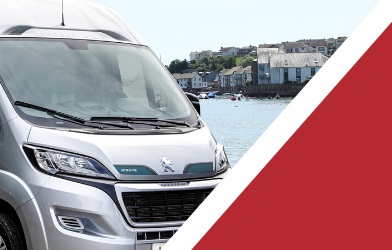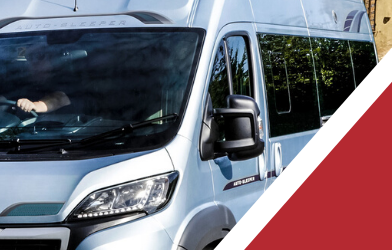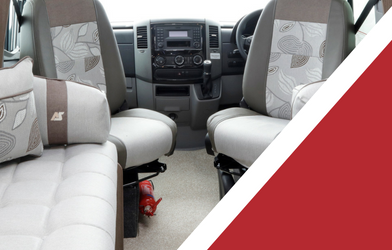If you are thinking about getting a motorhome, here are some of the most frequently asked questions (FAQs) we receive about the subject.
Can I drive a motorhome on an ordinary driving licence?
This is probably one of the most common questions we are asked here at Derby Motorhomes.
In the overwhelming majority of cases, thankfully, the answer is quite simply “yes, you can”. The exceptions largely relate to the weight of the motorhome you want to drive, how long ago it was that you passed your driving test, and your current age.
Essentially, anyone with a full driving licence for a car can also drive any motorhome up to 3,500kilos of Maximum Authorised Mass (MAM) or the weight of your vehicle when it is fully loaded. To drive a motorhome with a MAM of more than 3,500kilos, you will need to have passed your test before 1st January 1997.
Note that if you’re over 70 years of age, you will need a medical examination if the vehicle weighs more than 3,500kilos.
To double-check your eligibility to drive any particular motorhome, refer to the date on which you took your driving test, your current age, the weight of the vehicle in which you are interested and cross-reference to the official government website.
Can I import a supersize motorhome from the USA?
Yes, it is possible to import a US motorhome to the UK, but there are certain steps and requirements you will need to follow to do so legally and ensure that the vehicle complies with UK regulations.
The Government website states that to import a motorhome into the UK permanently you’ll need to register it. There is also a limit on size – you can’t register a motorhome more than 12 metres long and 2.55 metres wide.
The measurements do not include driving mirrors, rear bumpers, lamps, or reflectors.
While there is no height limit, if the motorhome is over 3 metres high, you must have a notice showing the height where the driver can see it.
Here’s a general outline of the importation process:
- Import Duty and VAT: You may need to pay import duty and Value Added Tax (VAT) when importing the motorhome. These fees can vary based on the vehicle’s value and age. Check with Her Majesty’s Revenue and Customs (HMRC) for the latest rates and requirements.
- Vehicle documentation: Gather all necessary documentation for the motorhome, including the title, bill of sale, and any other relevant paperwork. You’ll need these documents to prove ownership and value when importing the vehicle.
- Conformance to UK standards: Ensure that the motorhome complies with UK vehicle standards. This may involve making modifications such as adjusting lighting, installing side mirrors, etc.
- Type approval: Some vehicles may require type approval in the UK to ensure they meet safety and environmental standards. Check with the Driver and Vehicle Standards Agency (DVSA) to determine if this applies to your motorhome.
- Insurance: Obtain UK insurance cover for your motorhome. Insurance providers may have specific requirements for imported vehicles.
- Registration: Register the imported motorhome with the Driver and Vehicle Licensing Agency (DVLA). You’ll need to complete the necessary paperwork and pay any required fees.
- MOT Test: Ensure the motorhome passes the Ministry of Transport (MOT) test, which is mandatory for all vehicles over three years old in the UK. This test checks the vehicle’s roadworthiness and emissions.
- Road Tax: Pay the appropriate road tax (Vehicle Excise Duty) based on the motorhome’s emissions and specifications.
- Drive on the left: Keep in mind that in the UK, you drive on the left side of the road, so make sure the motorhome’s controls and driving orientation are suitable for UK roads.
- Customs clearance: If you are shipping the motorhome to the UK, you’ll need to go through customs clearance processes at the port of entry.
- Consult experts: It’s advisable to consult with experts or specialists in vehicle importation to ensure that you follow all the necessary legal and safety requirements.
Please note that regulations and requirements may change over time, so it’s essential to check with the relevant UK government agencies (HMRC, DVLA, DVSA, etc.) for the most up-to-date information before importing a US motorhome to the UK.
Additionally, consider consulting with a customs broker or import/export specialist for assistance with the process.
Also bear in mind that if you do import an RV, you may have difficulty with parking spaces when you use it, due to its size.
Do motorhomes need an MOT?
Once your motorhome is more than 3 years old – just like your car – it will need an annual MOT test.
There’s nothing special about it apart from the fact that some MOT testing stations might not be big enough to accommodate larger motorhomes.
Can I take my motorhome abroad?
Indeed, you can.
It’s one of the big attractions of this type of leisure holiday because the world becomes your oyster. In fact, many EU countries have arguably more and better facilities for casual motorhome parking than you might typically find in the UK.
Make sure your vehicle is fully legal on the road and that your motorhome insurance is up to date and valid for EU cover.
Pay particular attention to the fact that many motor insurance policies have a maximum number of consecutive days outside the UK or the maximum number of permissible days in total throughout the year.
If you are considering taking your motorhome outside of the European Union, plus those countries that are associated with it such as Norway and Switzerland, the position may be a little more complex.
First of all, you may be faced by the fact that your motor insurer requires the payment of an additional premium for such extended cover.
Secondly, some countries outside of Western Europe and the EU may have quite different rules of the road and particular requirements and rules governing the use of motorhomes.
If you are thinking about taking your motorhome to places in the Middle East, North Africa or countries in the far eastern parts of Europe, such as Russia, you might want to pay particular attention to government travel advice.
The Caravan Club also has some additional, useful information.
If I buy a motorhome second-hand from a private owner, are there risks involved?
If you are looking to purchase a motorhome through a private sale – because you’ve seen it advertised online or in the classified ads of your local newspaper, for instance – you need to be aware of the risks you are running.
Just like buying a second-hand car, the seller’s responsibilities after sale are limited – arguably, to the point of being zero.
By contrast, a dealership will have legal responsibilities that are more demanding and some of those will continue after the sale – particularly if they offer warranties, guarantees, or special servicing agreements, and the like.
Of course, you might sometimes find slightly lower prices from a private seller. It’s a question of weighing up all the risks of buying privately against the benefits of buying from a franchised dealer.
How easy would it be to customise my motorhome’s interior?
Assuming that you have the tools and equipment required, changing the layout of the interior of your motorhome can be relatively straightforward. However, it’s necessary to pass on a word of warning.
Firstly, be aware that there may be certain regulations governing health and safety of things such as electrical and gas fittings. Changing those about, as an amateur, might contravene regulations and be dangerous – not to mention the extent to which it will probably invalidate your insurance cover.
Secondly, buyers are typically inclined to be suspicious of DIY-type modifications to the interior of motorhomes. In fact, many dealerships remove all such modifications to get the vehicle back to its manufacturer’s standard in situations where they have purchased one that has been modified.
Of course, there are specialist organisations and workshops who will modify the interiors for you – if you require a more professional job to be done.
I have heard that parking at home can cause disputes
This is often very significantly over-stated and problems over parking your motorhome at home are rare.
We would suggest that there are basically five issues you need to think about in advance:
- your local council might ban on-street parking for safety or environmental impact (if you live in a conservation area, for example);
- the same might apply in rarer cases for on-driveway parking – this is usually again related to concerns about the appearance of the local area;
- it’s possible your deeds or lease might be subject to covenants prohibiting the parking of motorhomes or caravans on driveways – although these may not always be enforced or even known about by potentially affected neighbours;
- in some situations, parking your motorhome on your property might be an issue with neighbours if their view or light is suddenly restricted;
- your motorhome insurance might have restrictions on where you can park at home – on-street parking, for example, might be excluded while some policies might also require that your motorhome is parked in a garage (at your home or on an approved site) when it is not in use.
Is it easy to sell a motorhome?
This is another question we are often asked – together with related enquiries about the extent to which a used motorhome may hold its resale value.
Broadly speaking, there is a significant demand for pre-used motorhomes. As a result, they typically hold their value well – particularly when compared to conventional motor cars.
It is rare indeed for any motorhome to appreciate in value so, it is best not to look upon it as any type of financial investment. There might be some exceptions, such as if you’ve significantly improved or enhanced your motorhome – but generally they depreciate. In other words, it will typically be worth less when it is 7 years old than when it was brand new.
However, typically motorhomes depreciate far more slowly than the typical car. In that sense, they hold their value well. Of course, a lot depends upon things such as the condition of your vehicle, its age and mileage plus where you are selling it.
Although you might typically anticipate a higher value by selling to a private buyer, the delays in finding someone can be longer on average than if you’re selling to a dealership or using it as part-exchange.
Remember to be careful and adopt all “best practices” to protect your interests against fraud if you decide to sell to a private individual.




